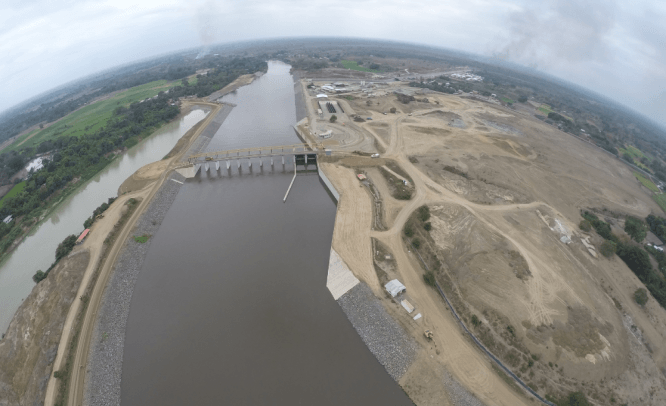Daule-Vinces Transbasin System will ensure permanent irrigation for more than 170,000 hectares
February 5, 2016: The Daule-Vinces Transbasin System, also known as DAUVIN, was inaugurated by Ecuadorian President Rafael Correa on December 22, 2015. The ceremony took place in Salamina, in the province of Guayas, where the Daule River Floodgate and Regulation Structure, one of the main components of the project, is located.
DAUVIN will improve the agricultural productivity and yield in the provinces of Guayas and Los Ríos, thereby generating product surpluses for export.
The counties benefited by the project’s operations are Balzar, Palestina, Santa Lucía, Colimes, Daule, Samborondón, Salitre, Baba, Vinces, Babahoyo and Pueblo Viejo. The project will benefit approximately 127,000 inhabitants and guarantee permanent irrigation for some 170,000 hectares of crops.
The diversion canal is one of nine major infrastructure projects that the national government has undertaken since 2007 with the aim of revamping Ecuador’s water resource capabilities, investing more than $1 billion in the process.
The Daule-Vinces Transbasin Project, built by Odebrecht, is one of the largest and most modern hydraulic works in Latin America, President Correa remarked while inspecting the Daule River Floodgate and Regulation Structure, which houses nine stop-log assemblies and two Tainter gates.
Water Secretary Carlos Bernal indicated that the Daule River Floodgate and Regulation Structure implanted in Salamica constitutes the heart of the project due to the fact that its gates control the flow and water levels in the Daule river, enabling the diversion of 96 cubic meters per second into the Daule-Nuevo main channel, a veritable artificial river stretching for 30.6 km, which delivers water at several key points along its path.
The technology
President Correa highlighted the technology applied by Odebrecht in the construction of the project. DAUVIN’s six pneumatic inflatable dams are installed in the southern region of the project, in the Pula, Mastrantal, Vernaza, Río Nuevo, Pueblo Viejo and Junquillo rivers. The inflatable dams span each of those riverbeds, in width ranging from 70 meters (Pula) to 26 meters (Junquillo), with the aim of forming natural reservoirs during the dry season. In this way, the water diverted in the Daule river is transported along the main channel and eventually reaches the points where the inflatable dams are installed, where it is stored and put to good use all year long.
The project will also generate other benefits, such as charging aquifers in the area which feed numerous water wells and help contain river salinity, especially in the southern region of the delta formed by the Daule and Babahoyo rivers, which would translate into increased agricultural production, as Mr. Bernal explained.
The project represents an investment of $275 million, and will directly benefit the local farmers, who, in the past, were barely able to harvest only once a year because of the area’s long dry periods, which can last up to eight months or even completely destroy the corn, coffee and rice crops during extreme droughts. Water shortages in the summer used to affect more than 90% of the local inhabitants. With DAUVIN, farmers will be able to plant short-cycle crops up to two-and-a-half times per year.

